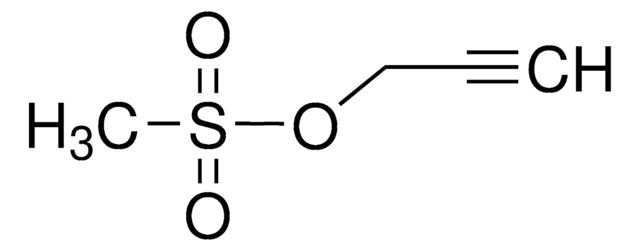09954
Propargyl p-toluenesulfonate
≥97.0% (GC)
Synonym(s):
Propargyl tosylate
About This Item
Recommended Products
Assay
≥97.0% (GC)
refractive index
n20/D 1.530
density
1.215 g/mL at 20 °C (lit.)
storage temp.
2-8°C
SMILES string
Cc1ccc(cc1)S(=O)(=O)OCC#C
InChI
1S/C10H10O3S/c1-3-8-13-14(11,12)10-6-4-9(2)5-7-10/h1,4-7H,8H2,2H3
InChI key
LMBVCSFXFFROTA-UHFFFAOYSA-N
Related Categories
Application
It can also be used as a reagent to synthesize:
- 2-hydroxy-4-pentynoic acid by an alkylation reaction with diethyl 2-acetamidomalonate followed by subsequent hydrolysis, decarboxylation, diazotization, and hydroxylation reactions.
- Furan derivatives by Pd-catalyzed reaction with acylchromates.
Signal Word
Warning
Hazard Statements
Precautionary Statements
Hazard Classifications
Eye Irrit. 2 - Skin Irrit. 2 - STOT SE 3
Target Organs
Respiratory system
Storage Class Code
10 - Combustible liquids
WGK
WGK 3
Flash Point(F)
212.0 °F - closed cup
Flash Point(C)
100 °C - closed cup
Personal Protective Equipment
Choose from one of the most recent versions:
Certificates of Analysis (COA)
Don't see the Right Version?
If you require a particular version, you can look up a specific certificate by the Lot or Batch number.
Already Own This Product?
Find documentation for the products that you have recently purchased in the Document Library.
Customers Also Viewed
Our team of scientists has experience in all areas of research including Life Science, Material Science, Chemical Synthesis, Chromatography, Analytical and many others.
Contact Technical Service











